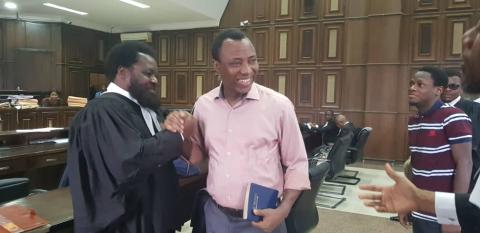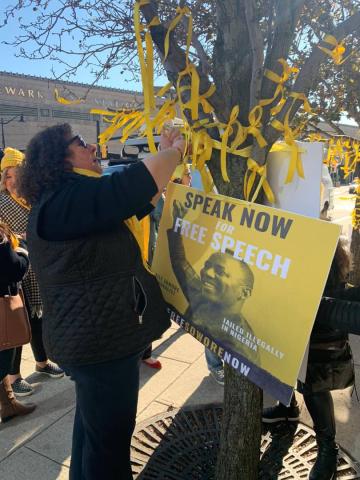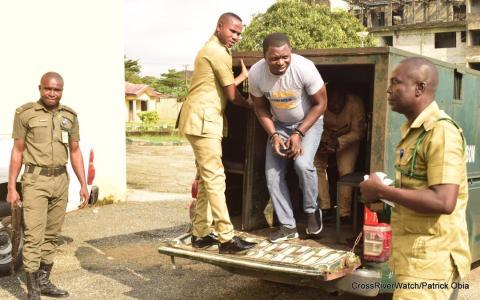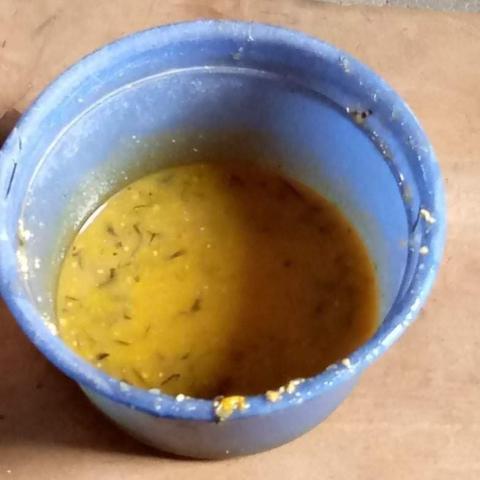
In Nigeria, Chief Justice of the federation, Muhammed Tanko, ordered the shutting down of all courts, thereby putting people like Sowore already confined to a particular city while undergoing trial as part of their bail conditions, in limbo.
"Good evening Oga," two high pitched voices chorused pleasantries as a thick blanket of darkness and unbearable heat slowly swallowed all remnants of light.
"Well-done o," he replied eagerly, half raising his body to make out the faces in his dimly lit retreat; these fleeting interactions with random passers-by had become his daily delight.
"It's 33°C tonight, it gets to 40°C in the day, very hot," he said, settling into his seat again.
Since first being arrested in the early hours of August 3, 2019 for calling on Nigerians to take to the streets on August 5 to demand a better country from the administration of President Muhammadu Buhari, up until this moment, Omoyele Sowore has had his rights and freedom trampled upon by the Nigerian Government in no small measure.
Though released on bail on December 24, 2019 after months of arbitrary detention in one of the dingy cells of the country’s ruthless secret police – the Department of State Services – the rights activist is not completely a free man yet. His bail terms forbids him from speaking with journalists and also confines him to Abuja, Nigeria’s capital, despite having no accommodation of his own in the city.
Four months since his release on bail, Sowore reckons that nothing much has changed especially since his movement is restricted and access to his family in New York, United States, denied.

“I call it a social prison. I live in an estate – very walled, each house is walled and it does not come alive at any point, I don't know who my neighbours are and they don't know who I am," he said, staring at the empty street that stretched out before him.
Since the World Health Organisation declared Coronavirus a global pandemic on January 30, 2020, countries around the world have shut down institutions and almost all forms of social life. This unanticipated jolt to the usual way of life has affected the many spheres of life including the justice system.
In Nigeria, Chief Justice of the federation, Muhammed Tanko, ordered the shutting down of all courts, thereby putting people like Sowore already confined to a particular city while undergoing trial as part of their bail conditions, in limbo.
"Who are those people? What do you want?" Sowore asked pointedly towards his gate as he lifted himself from his chair. It was already dark but he had quickly observed two men parked in a Toyota Camry outside his gate. The men drove off after his inquiry.
"Does this happen often?" I ask. The look on his face said it did before he went on to explain.
"Before the COVID-19 lockdown in Abuja started, there was a plot to arrest me. I raised an alarm about this on my Facebook page but I don't worry about it.
“As you can see tonight, this is probably another attempt at surveillance. I am under constant surveillance here," he said.
Sowore has not seen his family, who lives in New York, the epicentre of Coronavirus in the United States, since his arrest last August by Nigeria's secret police.
"It's scary, I am worried about my health here as I am worried for them. There is not enough testing, so I am double worried.
“I am not with my family who can offer the most support at this difficult time, my case is stalled by the pandemic," he said.

No date of return
Sowore was declared a Prisoner of Conscience by Amnesty International after findings revealed that his prosecution by the state was purely political, targeted at silencing dissent and shrinking the civic space in the country.
"My little kids have to deal with the pandemic without their father, they ask me all the time when I am coming home and I have no date to give them, they are growing up without me.
"They thought that when I was in court and freed from detention that I would be allowed to see them. They are disappointed because it's almost a year and still not seeing them in-sight,” he added.

Sowore is not without acclaim. Before his arrest, detention and eventual confinement when he visited Nigeria for a short business trip, he used to work as a reporter for his New York-based online news publication, SaharaReporters. He also taught post-colonial African history at the City University in New York and is a rights activist of international repute.
Surviving in a lockdown
Since Nigerian courts were unable to provide accommodation for Sowore after he was confined to Abuja, he disclosed that he has borne the "inconvenient cost". The closing of the courts, which meant his trial, which was scheduled for April 2, has been stalled indefinitely due to the Coronavirus outbreak equally created a new strain to his financial situation.
"It's terrible. I work for myself at SaharaReporters, I am self-employed and apart from that, I teach at the university in New York but since last year, I have been unable to work by teaching my students. How do I make a living and support my family in this time of crisis?
"The government has shut down all my assets and frozen all my personal and business accounts. I survive mainly on charity from my wife and close friends, who raise personal funds on my behalf.
"It is hard to be without food and medicine at this time of global uncertainty. I cannot even get to my doctors if something happens to me.
“You know I've lived in the US for more than 20 years, my doctors are all there. I live as miserly as possible," he said.

I will sue if I am pardoned
Sowore remains defiant, he maintains he is innocent of the charges preferred against him. At the start of his legal battle, he was charged on seven counts including money laundering and insulting the President – those charges have now been withdrawn by the Nigerian Government.
"I want the prosecution to stop dragging its feet if it has a case against me. But they don't, I hear that some people have been pardoned but who are they?
"At a time like this when people like El-Zakzaky, who has underlying health problems should be released on compassionate grounds, the government is pardoning dead people, who have already been pardoned," he said, referencing a recent move by President Buhari to free 2600 prisoners including governor of the defunct Bendel State, Prof. Ambrose Alli, late Chief Anthony Enahoro, Lt.-Col. Moses Effiong (retd), Major E.J. Olanrewaju, and Ajayi Olusola Babalola.
"If President Muhammadu Buhari or anyone else pardons me I will sue them because I didn't commit any offense.
“I hear they are planning to pardon their corrupt stooges like Orji Uzor Kalu and Dariye; I am not surprised," Sowore said.
Detained for journalism
Blindfolded, tortured and whisked away by road, rights activist and journalist, Abga Jalingo, ended up handcuffed to a refrigerator for a publication about corruption in his newspaper.

Jalingo, whose trial has also been stalled due to the Coronavirus outbreak, was first arrested on July 22, 2019.
"I was supposed to be in court on April 6, 7 and 8 but that has not happened because courts are shut during the lockdown," Jalingo told SaharaReporters.
The charge sheet against him cites an article where he questioned the whereabouts of N500m approved for the establishment of Cross River State Microfinance Bank. The Committee to Protect Journalists also reported that one of the charges accused him of planning to unseat the governor of Cross River State, Ben Ayade, who is fingered in Jalingo's article for alleged financial impropriety and misuse of state funds.
Despite being granted bail on February 13, Jalingo is in a state of limbo because the closure of courts occasioned by the COVID-19 pandemic has left him waiting, unattended to by the justice system.
"I am ready for my trial even though I am calling on those who instituted trumped-up charges against me to drop it.
“I am confident that the system will eventually exonerate me," he said.

But it has not been easy
Jalingo, who was detained for six months under unfavourable circumstances, understands better than anyone what it means to be stuck in one spot by situations beyond his control like the COVID-19 pandemic.
He said, "It was difficult. As you know I was locked up for six months and then shortly after regaining my freedom, we had to go on lockdown, so I haven't been able to earn any money, it is a difficult time."
Jalingo says the manner in which he was arrested and detained has caused great trauma for his loved ones, who still suffer from post-traumatic stress as a result of his ordeal.

Before he was arrested, he received an invitation from the police but was out of state. After explaining, his invitation was moved to August 26, 2019.
The journalist however, never got the opportunity to honour the invitation because he was forcefully arrested four days before the scheduled date.
"My absence has been traumatic, especially for my wife because of the way and manner I was arrested.
"She has Post Traumatic Stress Disorder and was supposed to commence treatment before the lockdown started but now she cannot access the treatment she needs until it's safe to go out again.
"She has been through a lot but I am trying to make up for lost time during the lockdown and give her all the support she needs," Jalingo said.
On his mental health, Jalingo disclosed that he is sad.
"I lost my brother while in detention, I haven't seen his grave due to the lockdown, I never saw his corpse either.
"I wake up thinking about all the times we shared and I am sad," he said.
Like Sowore, Jalingo is defiant and hoping for an end to "the oppression" of his people.
"It is familiar terrain, it's not my first time in jail or prison. It's moments like this that give me hope, I am not tired or weary," he stated.

Nigerian lawyers however, want cases like that of Sowore and Jalingo to be heard through innovative means and quickly, too.
Senior Advocate of Nigeria, Femi Falana, recently called on Nigeria's Chief Justice, Tanko, to mandate judges to hear urgent cases via video conferencing apps like Skype and Zoom during the ongoing lockdown occasioned by Coronavirus.
Falana said, “Since the Federal Government has relaxed the lockdown by allowing markets, shops and stalls selling food and groceries to open to customers between the hours of 10:00am and 2:00pm daily, the National Judicial Council ought to review the suspension of court sittings to enable them attend to urgent matters to ensure that thousands of people, who are either awaiting trial or under investigation are not subjected to unlawful detention.
“The review has become necessary in view of the fact that motions for the bail of many criminal suspects and applications to secure the enforcement of the fundamental right to personal liberty of other detainees are pending in several courts in all states of the federation and in the federal capital territory.
“In addition, the return dates in respect of several ex parte orders made by magistrates for the remand of a number of criminal suspects which have since expired are due to be quashed or renewed to extend time for further investigation.
“However, in order to observe the social distancing directive, we suggest that arrangements be made for judges to hear urgent applications via Skype or Zoom."
Adding his voice to the matter, rights lawyer, Inibehe Effiong, believes that provision of palliatives should be made for all Nigerians during the lockdown including political detainees and prisoners of conscience.
He said, "Government is supposed to provide palliatives for every citizen affected by the lockdown put in place to stop the spread of COVID-19.
"The right to earn a living is an auxiliary of the right to life, even decisions of the court sometimes. When government takes decisions or actions that deprive people of the right of livelihood, that is an indirect attack on their right to life.
"If the restriction of Sowore, for example, has been confined to Abuja by the court and deprived him of his source of livelihood, it can be taken up in the future when the judicial process has been concluded."